
Deus Ex is a 2000 action role-playing video game developed by Ion Storm and published by Eidos Interactive. Set in a cyberpunk-themed dystopian world in the year 2052, the game follows JC Denton, an agent of the fictional agency United Nations Anti-Terrorist Coalition (UNATCO), who is given superhuman abilities by nanotechnology, as he sets out to combat hostile forces in a world ravaged by inequality and a deadly plague. His missions entangle him in a conspiracy that brings him into conflict with the Triads, Majestic 12, and the Illuminati.

The ZX Spectrum is an 8-bit home computer developed and marketed by Sinclair Research. Considered one of the most influential computers ever made, it is also one of the best-selling British computers ever, with over five million units sold. It was released in the United Kingdom on 23 April 1982, and around the world in the following years, most notably in Europe, the United States, and Eastern Bloc countries.
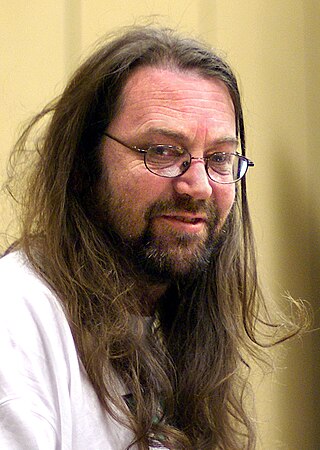
Jeff Minter is an English video game designer and programmer who often goes by the name Yak. He is the founder of software house Llamasoft and has created dozens of games during his career, which began in 1981 with games for the ZX80. Minter's games are shoot 'em ups which contain titular or in-game references demonstrating his fondness of ruminants. Many of his programs also feature something of a psychedelic element, as in some of the earliest "light synthesizer" programs including Trip-a-Tron.
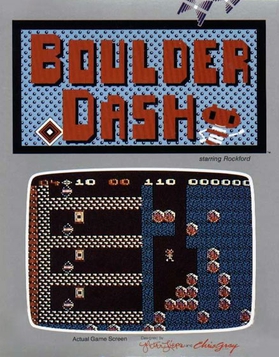
Boulder Dash is a maze-based puzzle video game released in 1984 by First Star Software for Atari 8-bit computers. It was created by Canadian developers Peter Liepa and Chris Gray. The player controls Rockford, who tunnels through dirt to collect diamonds. Boulders and other objects remain fixed until the dirt beneath them is removed, then they fall and become a hazard. Puzzles are designed around collecting diamonds without being crushed and exploiting the interactions between objects. The game's name is a pun on balderdash.

Jetpac is a shooter video game developed and published by Ultimate Play the Game and released for the ZX Spectrum and VIC-20 in 1983 and the BBC Micro in 1984. It is the first game to be released by Ultimate Play the Game, the company which later became Rare. The game follows Jetman as he must rebuild his rocket in order to explore different planets, while simultaneously defending against hostile aliens. It was written by Ultimate co-founder Chris Stamper with graphics designed by his brother, Tim Stamper. Reviewers praised Jetpac's presentation and gameplay, and it won "Game of the Year" at the Golden Joystick Awards in 1983.
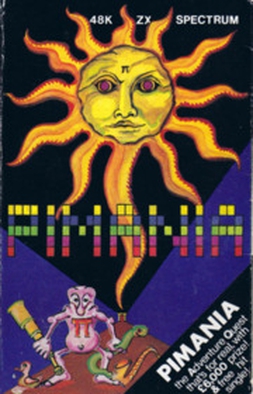
Pimania is a text-and-graphics adventure game written by Mel Croucher and released by Automata UK in 1982 for the BBC Micro, ZX Spectrum, Dragon 32, and ZX81. It was the first real-life video game treasure hunt to be released. It was inspired by the 1979 Kit Williams book Masquerade. Automata gave a prize of a golden sundial worth £6,000 for the first person to solve the various cryptic clues to its location that were hidden within Pimania.

Gun.Smoke is a vertically scrolling run and gun video game and designed by Yoshiki Okamoto and released in arcades in 1985. Gun.Smoke centers on a character named Billie Bob, a bounty hunter going after the criminals of the Wild West.
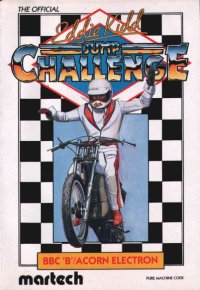
Eddie Kidd Jump Challenge is a stunt bike video game released for the Acorn Electron, BBC Micro, Commodore 64, MSX and ZX Spectrum first released in 1984, licensed by British stunt performer, Eddie Kidd.

Mel Croucher is a British entrepreneur and video games pioneer. Originally an architect, he moved into computers and in 1977 launched one of the very earliest games companies, Automata UK, as an extension of his publishing business. He is now credited for setting up "the first games company in the U.K.", celebrated as "the father of the British videogames industry" and presented as "a pioneer in affective computing". His first broadcasts of computer game software were made over AM and FM radio. After the release of the Sinclair ZX81, his label published several games for the early home computer market, including three Computer Trade Association award-winners: Pimania (1982), Groucho, and the groundbreaking "multi-media" title Deus Ex Machina (1984).
Deus ex machina is a Latin term meaning "god from the machine", and is used to indicate a person or event which provides a sudden, unexpected solution to a story.
The ZX Spectrum's software library was very diverse. While the majority of the software produced for the system was video games, others included programming language implementations, Sinclair BASIC extensions, databases, word processors, spread sheets, drawing and painting tools, and 3D modelling tools.

My Name Is Uncle Groucho, You Win a Fat Cigar is a computer game developed and published by Automata UK for the ZX Spectrum in 1983. Groucho was designed by Mel Croucher who was better known for his later works Deus Ex Machina and ID.
David Lowe also known as "Uncle Art" is a British composer known for his work on computer games from 1985 to 1998.

Splat! is a maze video game published for the ZX Spectrum in 1983 by Incentive Software of Reading, England. It was subsequently released for the Amstrad CPC, Commodore 64, and SAM Coupé.
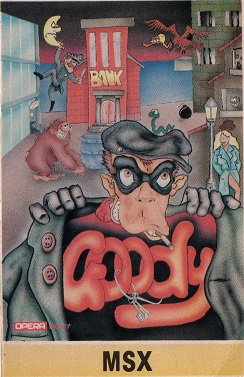
Goody is a platform game developed by Gonzalo Suárez Girard and released in 1987 by the Spanish company Opera Soft. The game was released for Amstrad CPC, Amstrad PCW, MSX, ZX Spectrum, and for MS-DOS compatible computers.
Automata UK was a software house which developed and published ZX Spectrum video games between 1982 and 1985. Significant releases included Pimania (1982), My Name Is Uncle Groucho, You Win A Fat Cigar (1983) and Deus Ex Machina (1984).
Alberto José González Pedraza is a Spanish video game graphic artist, music composer, designer, producer, and co-founder of Bit Managers and Abylight, who has worked on a variety of titles, most notably games released by French video game publisher Infogrames. He has composed music for or worked on over 60 games, ranging from music composition to graphic programming, and eventually became one of the lead designers at the Spanish developer Abylight. Despite having composed dozens of full soundtracks for video games, González has never had any formal music training.

The Thompson Twins Adventure is a 1984 graphic adventure game that was distributed by Computer and Video Games magazine as a promotional 7" flexi disc "freebie" along with its October 1984 issue. The game is based on the Thompson Twins' single "Doctor! Doctor!", and features the Thompson Twins band members as the protagonists. The unusual storage format of the game showcases an experimental technique pioneered by the London-based Flexi Records label, and places the game alongside a small handful of other games distributed on grooved disks. This format never became established and The Thompson Twins Adventure is today valued more for its nostalgic and artifactual value than for its ludological aspects which have been uniformly panned by critics.
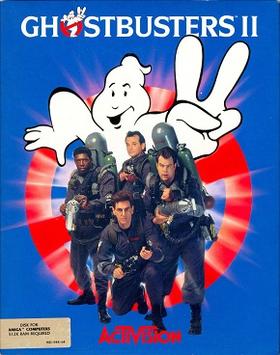
Ghostbusters II is a 1989 action game based on the film of the same name. It was published by Activision for various computer platforms. British studio Foursfield developed a version for Commodore 64, Amiga, Atari ST, Amstrad CPC and ZX Spectrum, which also got ported to the MSX by New Frontier. It features three levels based on scenes from the film. Dynamix developed a separate version for the DOS, also based on the film. The non-DOS versions were praised for the graphics and audio, but criticized for long loading times, disk swapping, and the final level. The DOS, Commodore 64 and Amiga versions were the only versions released in North America.














